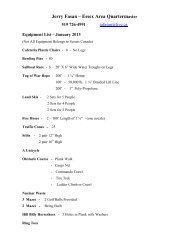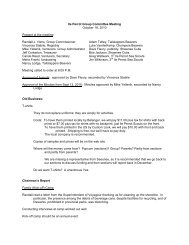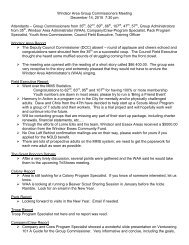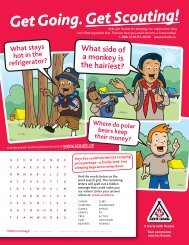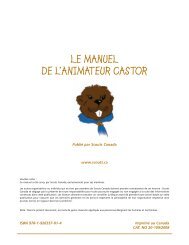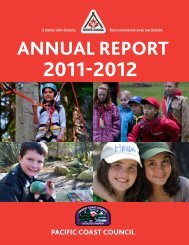Beaver Leader's Handbook - Scouts Canada
Beaver Leader's Handbook - Scouts Canada
Beaver Leader's Handbook - Scouts Canada
Create successful ePaper yourself
Turn your PDF publications into a flip-book with our unique Google optimized e-Paper software.
develop the <strong>Beaver</strong>s, and build their interest and enthusiasm, but keep it simple and flexible. Be<br />
prepared to change items or discard them if you sense they are not appealing to the <strong>Beaver</strong>s. Ask<br />
for the <strong>Beaver</strong>’s opinions, and welcome their ideas.<br />
THE POND (MEETING PLACE)<br />
Keep the following details in mind when choosing a pond.<br />
Size<br />
A multi-purpose school room, a small gymnasium, a church basement, a hall or a community club<br />
is a good size. If the room is too large, your <strong>Beaver</strong>s will have more room to wander and be more<br />
difficult to organize. Other factors to consider include: access to bathrooms, a source of water for<br />
clean-up, accessibility for special needs such as a wheelchair and possible use of kitchen facilities.<br />
Type of Floor<br />
<strong>Beaver</strong>s are often messy when doing handicrafts; few caretakers appreciate glue, crayons or<br />
paint on their floors. Several large pieces of plastic sheeting or newspaper will help solve<br />
potential difficulties. Similarly, ensure your <strong>Beaver</strong>s wear proper shoes on gym floors.<br />
Cupboard Space<br />
If cupboard space is available for colony equipment, it’s a great help to leaders. If no space is<br />
available, look for a large trunk which can be stored somewhere within the building. This will<br />
save transporting regularly-used items each week.<br />
Make sure you have a firm understanding about the day and hours of the meeting. Check with<br />
your group/section committee, the sponsor/partner and the caretaker of the building you’re<br />
using. The agreement should provide for either exclusive rights to the time period and place, or<br />
sufficient advance notice of changes. Make sure you also know what equipment you may use,<br />
what you can hang on walls, which entrance and washrooms are available and whether you are<br />
required to turn off lights, sweep floors, etc. Check the location of fire exits, and develop an evacuation<br />
plan in case of fire.<br />
Time<br />
Some colonies meet in the afternoon after school or on Saturdays, but most meet on weekday<br />
evenings from 6:00 p.m. or 6:30 to 7:15 or 7:45 p.m. Be consistent about time and place; it’s<br />
essential with children of this age, and only fair to parents. Set expectations that parents will<br />
drop-off and pick-up <strong>Beaver</strong>s promptly, or make you aware of other arrangements.<br />
Sixty to 75 minutes of actual program time is generally a suitable length for a colony meeting.<br />
Preliminaries and tidying up after the meeting may add half an hour for the leaders.<br />
Colony Equipment<br />
You need equipment to run the colony. If you don’t already have it, make it a priority to gather<br />
together what is best suited to your needs and the activities your <strong>Beaver</strong>s enjoy.<br />
Here’s a basic list you may want to gather. You can get by with less, of course, but it’s nice to have<br />
a good supply.<br />
First Aid<br />
First aid equipment appropriate to <strong>Beaver</strong> activities should be provided, and personnel familiar with<br />
its use should be available. Physical Fitness Certificates completed by parents should be close at hand.<br />
4-2



